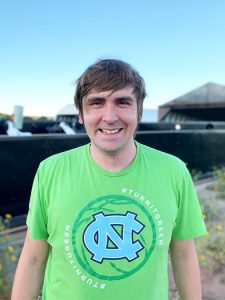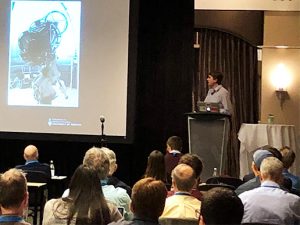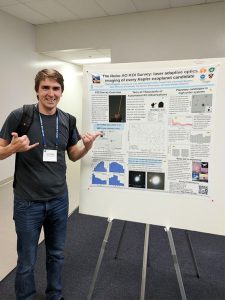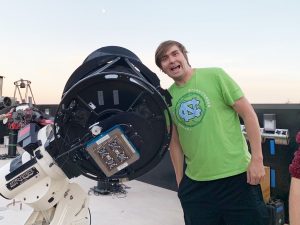Former Dunlap Institute Postdoctoral Fellow Carl Ziegler has been hired as an Assistant Professor in the Department of Astronomy at Stephen F. Austin State University in Nacogdoches, Texas.
At U of T, he led a survey team that confirmed dozens of TESS (Transiting Exoplanet Survey Satellite) planets using robotic instrumentation.
The team at Dunlap checked in with Ziegler to chat about his time at Dunlap, and how he’s enjoying his new position.
Congratulations on your new position as Assistant Professor! What are you most looking forward to in the role?
I look forward to developing a program at SFA that gives young researchers the opportunity to learn about and contribute to a large, international effort to follow-up the extrasolar planet discoveries of the TESS satellite. These planets are accessible to small, sub-meter sized telescopes, which when automated to improve efficiency, can deliver meaningful results. It was undergraduate research which inspired me to pursue astronomy as a career, and I look forward to lighting a similar spark in these budding astronomers.
Of course, you recently made a big move. Tell us how you’re settling in?
One of the biggest things to get used to was the change in weather between Toronto and Texas (e.g., wearing t-shirts in January). Also, the pandemic has made it much more difficult to get out and meet people, but we look forward to exploring our new home state, hopefully later this year.
Tell us a bit about your field of research.
I’m interested in how exoplanets are impacted by close binary systems. About half of stars like our sun have a companion, and it seems the presence of a second star in a system, if orbiting within approximately the distance of Pluto’s orbit, can have a dire effect for any planets. To study these systems, large surveys using robotic instruments are used that can image in high-resolution.
What originally brought you to the Dunlap program?
The Dunlap program was very appealing to me due to its emphasis on instrumentation and outreach. The support that I received at Dunlap to pursue an instrumentation project, a robotic telescope to perform planetary transit follow-ups, was something I likely would not have found at many other institutions. Dunlap also values reaching out to the community, enabling Fellows to create new programs or support existing programs (e.g., Astronomy on Tap), and the education of future astronomers, such as through the annual Instrumentation Summer School or summer undergraduate research experience.
What are you most proud of about your time at Dunlap?
I’m most proud of the One Hit Wonders survey which I developed and led, while supported by the Dunlap seed funding. The One Hit Wonders survey consists of a robotic telescope located in a dark site in New Mexico. The survey seeks to confirm single-transit planets detected by the TESS satellite through photometric observations. The development of the survey posed unique challenges for both automation, data processing, and reliability (which became even more important once the pandemic cut off potential travel to the site).
While at Dunlap, I also led the SOAR TESS survey. This project used the speckle interferometric technique to obtain high-resolution images of planetary systems. To date, we have observed over 90% of the accessible Southern planet candidate hosting systems. An important step in confirming the signal TESS detected is indeed planetary in nature is understanding the stellar environment from which it emanates, and the results of this survey have been used to validate over 70 planets around bright host stars.
How do you think Dunlap was helpful in advancing you into your current new role?
Dunlap provided me the support and opportunities that were needed to be successful in my new position. The ability to pursue projects independently, while also having a large network of astronomers nearby to collaborate with, was a phenomenal experience. Through the summer undergraduate research program, I was able to mentor two fantastic students, which confirmed in my mind a need to focus on teaching and supporting early-career research in my future career.
The Dunlap Institute for Astronomy & Astrophysics at the University of Toronto is an endowed research institute with more than 90 faculty, postdocs, students and staff, dedicated to innovative technology, ground-breaking research, world-class training, and public engagement. The research themes of its faculty and Dunlap Fellows span the Universe and include: optical, infrared and radio instrumentation; Dark Energy; large-scale structure; the Cosmic Microwave Background; the interstellar medium; galaxy evolution; cosmic magnetism; and time-domain science. The Dunlap Institute for Astronomy and Astrophysics, David A. Department of Astronomy & Astrophysics and the Canadian Institute for Theoretical Astrophysics comprise the leading centre for astronomical research in Canada, at the leading research university in the country, the University of Toronto.




